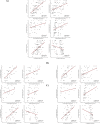Epigenetic age deacceleration in youth at familial risk for schizophrenia and bipolar disorder
- PMID: 37156786
- PMCID: PMC10167217
- DOI: 10.1038/s41398-023-02463-w
Epigenetic age deacceleration in youth at familial risk for schizophrenia and bipolar disorder
Abstract
Epigenetic modifications occur sequentially during the lifespan, but their pace can be altered by external stimuli. The onset of schizophrenia and bipolar disorder is critically modulated by stressors that may alter the epigenetic pattern, a putative signature marker of exposure to environmental risk factors. In this study, we estimated the age-related epigenetic modifications to assess the differences between young individuals at familial high risk (FHR) and controls and their association with environmental stressors. The sample included 117 individuals (6-17 years) at FHR (45%) and a control group (55%). Blood and saliva samples were used estimate the epigenetic age with six epigenetic clocks through methylation data. Environmental risk was measured with obstetric complications, socioeconomic statuses and recent stressful life events data. Epigenetic age was correlated with chronological age. FHR individuals showed epigenetic age deacceleration of Horvath and Hannum epigenetic clocks compared to controls. No effect of the environmental risk factors on the epigenetic age acceleration could be detected. Epigenetic age acceleration adjusted by cell counts showed that the FHR group was deaccelerated also with the PedBE epigenetic clock. Epigenetic age asynchronicities were found in the young at high risk, suggesting that offspring of affected parents follow a slower pace of biological aging than the control group. It still remains unclear which environmental stressors orchestrate the changes in the methylation pattern. Further studies are needed to better characterize the molecular impact of environmental stressors before illness onset, which could be critical in the development of tools for personalized psychiatry.
© 2023. The Author(s).
Conflict of interest statement
CDC has received grant support from Instituto de Salud Carlos III, Spanish Ministry of Science and Innovation (PI17/00481, PI20/00721, JR19/00024) and honoraria from Exeltis and Angelini. The other authors declare no conflict of interest.
Figures



